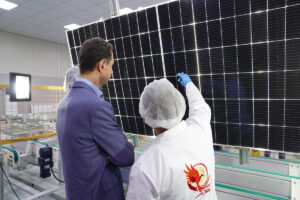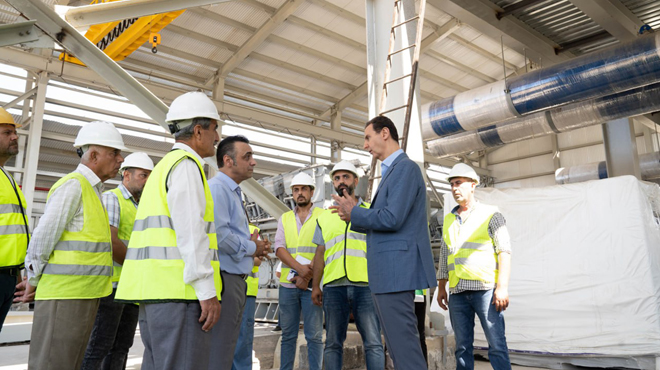On August 3rd, President Bashar Al-Assad visited the new power plant in the city of Banias, which is in the final stages of its construction and will be put into service within the coming weeks.
The new power plant will initially produce around 24 megawatts, a production capacity that will rise to 56 megawatts in the next phase.
President Al-Assad also visited the Syrian company for the production of photovoltaic collectors, which was recently established in Lattakia with advanced production lines to manufacture the solar panels necessary to establish solar energy systems.
 President Al-Assad stressed that “every increase in the level of electricity production, no matter how small it is, will have useful results, and at the same time, solar energy is very important for us as power stations and for us at the domestic level”.
President Al-Assad stressed that “every increase in the level of electricity production, no matter how small it is, will have useful results, and at the same time, solar energy is very important for us as power stations and for us at the domestic level”.
President Al-Assad said to the cadres working at the construction site of the new power plant in Banias: We all know that we are living with the electricity problem, but what caught my attention and led me to come is not the issue of electricity, as there are many stations that we can visit, but when we usually want to complete projects, sometimes such projects take a longer time, or even a double time for various reasons which include these days the war and the blockade. As the talk about the current station in which we are present now began about a year and a half or more ago with the private sector, we were surprised that everything is proceeding according to the planned time, and this in itself is an achievement that will be recorded for you as Syrian workers, technicians, and engineers. .
President al-Assad added: First, I want to express my appreciation on this point in particular, which is a point of distinction. When we are able, in conditions of war and siege, to complete a project according to time, it is a very important matter, and the second point is that this project is one of the first projects for cooperation between the private and public sectors. Last year, cooperation was started on solar energy in Adra. As for conventional energy, this is the first time this happens. I have previously addressed the issue of “coward” capital and “national” capital. They say that capital is “coward”. We say that the capital is “national”. If the capital was a coward, we would not have built this station in this circumstance. It is not permissible for the national capital to be anything but brave, and this is a very important model for you to present. Within weeks, a month, or a month and a half, electricity production will start and be reflected on the people. It is true that 24 megawatts for the national need is considered a little, but any addition now to the issue of electricity will reflect on people and all aspects of life that we live today.
President al-Assad continued: Therefore, we are awaiting to see the results in a short period, and we are thinking whether this type of station is based on the experiment as a station of small size, and in a second phase, beside this, we may start similar experiences in other regions, considering that the previous stations in Syria are all major stations, so is this type of station more feasible in Syria in general as a small country, or feasible because of the electricity crisis, or feasible from a technical point of view because there is waste?
President al-Assad said: Last year, when we opened a station in Aleppo or part of the station, we allocated all electricity to the city of Aleppo and the Governorate of Aleppo for two reasons. The first of them is that the city is productive and has a severe shortage, but on the other hand, when you generate electricity in the same area, then you save from electricity losses. We leave this to experiment, but if we think about it, it may be the beginning of technological decentralization, which is different from decentralization with regard to the governorates in terms of powers, but this may be a solution to the problems of each region from a technically independent point of view which may save us a lot of money, and in the later stage it can be thought that this thing will become part of decentralization, and electricity is generated for each region independently of the second region, and it is sold independently through the electricity directorates, but in isolation from the “central” form.
President al-Assad added: It is a new experience, but certainly a pioneering experience in all respects, especially for the first real partnership between the public and the private sectors in projects that were considered for a long time to be projects that if the state did not undertake them, no one can carry them out, and this always confirms that when the private sector is patriotic, then it is able to support the state and thus reflect on the citizens.. It is very important for you to know where your role is in the picture.. It is true that you work on technical issues, but you should know that technical issues in the end are a national process.. That is why I liked that I come, even for a quick visit, to see and understand all the details from the director, and I follow up with you and I see that these things are going well and call for optimism… God willing, the second phase will begin as quickly as possible so that there will be no delay, and we will reduce as much as possible the very severe electricity crisis in Syria.
NR / Inas Abdulkareem

